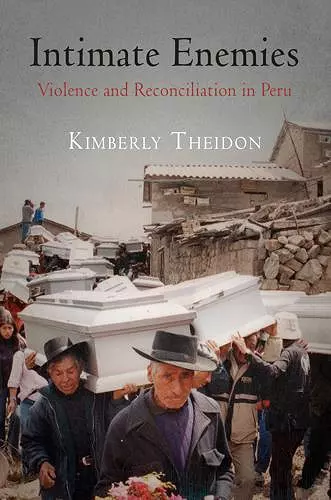Intimate Enemies
Violence and Reconciliation in Peru
Format:Paperback
Publisher:University of Pennsylvania Press
Published:13th Jun '14
Currently unavailable, and unfortunately no date known when it will be back

Drawing on years of research in the highlands of Ayacucho, Kimberly Theidon explores how Peruvians are rebuilding individual lives and collective existence following twenty years of armed conflict. The micropolitics of reconciliation practiced there complicates the way we understand transitional justice and coexistence in the aftermath of war.
In the aftermath of a civil war, former enemies are left living side by side—and often the enemy is a son-in-law, a godfather, an old schoolmate, or the community that lies just across the valley. Though the internal conflict in Peru at the end of the twentieth century was incited and organized by insurgent Senderistas, the violence and destruction were carried out not only by Peruvian armed forces but also by civilians. In the wake of war, any given Peruvian community may consist of ex-Senderistas, current sympathizers, widows, orphans, army veterans—a volatile social landscape. These survivors, though fully aware of the potential danger posed by their neighbors, must nonetheless endeavor to live and labor alongside their intimate enemies.
Drawing on years of research with communities in the highlands of Ayacucho, Kimberly Theidon explores how Peruvians are rebuilding both individual lives and collective existence following twenty years of armed conflict. Intimate Enemies recounts the stories and dialogues of Peruvian peasants and Theidon's own experiences to encompass the broad and varied range of conciliatory practices: customary law before and after the war, the practice of arrepentimiento (publicly confessing one's actions and requesting pardon from one's peers), a differentiation between forgiveness and reconciliation, and the importance of storytelling to make sense of the past and recreate moral order. The micropolitics of reconciliation in these communities present an example of postwar coexistence that deeply complicates the way we understand transitional justice, moral sensibilities, and social life in the aftermath of war. Any effort to understand postconflict reconstruction must be attuned to devastation as well as to human tenacity for life.
"Extremely valuable and moving." * TLS *
"What happened in Andean communities after the insurgency? Some community members, even those who had not fought with the Shining Path, had sympathized with it. Others, including army veterans and widows and orphans, had not. Kimberly Theidon, a medical anthropologist, describes their painful adjustments to coexistence. She shows that public confessions and apologies, healing rituals and storytelling, and degrees of punishment and reparation helped to 'settle accounts.' More than any other scholar of Peru's war, Theidon humanizes the legacy of the violence and indicates just how much the trauma still burdens Peru today." * Foreign Affairs *
"What is it like for ordinary people to live through revolutionary violence and the state's repression of that violence? This stunning book offers amazing and troubling insight into the lives of peasants in highland Peru who endured the revolutionary and increasingly violent movement of the Shining Path and the onslaught of soldiers seeking to ferret out and destroy it. Kimberly Theidon describes vividly, through powerful stories and quotes, what happened to the people caught in the conflict. Her rich, ethnographic account also describes resilience in the face of suffering, moments of joy and caring, efforts to rebuild and to forget. This is not simply a story of human suffering, but also one of endurance and recovery." * Human Rights Quarterly *
"In her masterful ethnography of the legacies of violence in Ayacucho, Peru, Kimberly Theidon offers a critical intervention into discussions of postconflict reconstruction and transitional justice. Intimate Enemies exemplifies hauntingly the power of the ethnographic method and demonstrates eloquently what anthropology can offer contemporary debates. At a time when universities and in particular social science departments are coming under attack for their lack of demonstrable worth, this work makes a vital case for importance of long-term, extended fieldwork and reflection." * Journal of Latin American and Caribbean Anthropology *
"In an age of knee-jerk common sense that trauma means PTSD, this fine ethnography reveals the deep and complex currents between collective experiences of violence, subjective ambivalence, memory, and a community's talk about terror that constitutes the uncommonsensical lived experience of survivors of Peru's era of violence and reconciliation. A real achievement!" * Arthur Kleinman, Harvard University *
"Kimberly Theidon's thoughtful ethnography explores the irreducible complexity of civil wars. This is a troubling-indeed, unforgettable-look at violence up close and personal, and one with broad policy implications in settings far beyond Peru. Drawing upon complementary disciplines to present a finely tuned study of violence both structural and intimate, and its legacies in the lives of individuals, families, and communities, Intimate Enemies reminds us that the reverse side of suffering is often resilience; but beyond these is sometimes heard a mortal silence, and the long and debilitating echo of conflicts large and small." * Paul Farmer, Harvard University *
"A very important work for the fields of anthropology and human rights. . . . Intimate Enemies is a unique, path-breaking ethnography of community responses to situations of extreme violence, of the clash of armed rebels seeking to overthrow the state and counterinsurgency soldiers." * Kay Warren, Brown University *
- Commended for Received Honorable Mention for the 2013 Eileen Basker Prize from the Society for Medical Anthropology 2021
- Commended for Received Honorable Mention for the 2013 Book Award for Human Rights in Latin America from the Washington Office on Latin America-Duke University Libraries 2021
ISBN: 9780812223262
Dimensions: unknown
Weight: unknown
480 pages